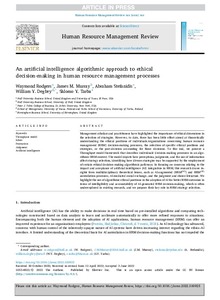An artificial intelligence algorithmic approach to ethical decision-making in human resource management processes
Degbey William Y.; Stefanidis Abraham; Tarba Shlomo Y.; Rodgers Waymond; Murray James M.
https://urn.fi/URN:NBN:fi-fe2022091258826
Tiivistelmä
Management scholars and practitioners have highlighted the importance of ethical dimensions in the selection of strategies. However, to date, there has been little effort aimed at theoretically understanding the ethical positions of individuals/organizations concerning human resource management (HRM) decision-making processes, the selection of specific ethical positions and strategies, or the post-decision accounting for those decisions. To this end, we present a Throughput model framework that describes individuals' decision-making processes in an algorithmic HRM context. The model depicts how perceptions, judgments, and the use of information affect strategy selection, identifying how diverse strategies may be supported by the employment of certain ethical decision-making algorithmic pathways. In focusing on concerns relating to the impact and acceptance of artificial intelligence (AI) integration in HRM, this research draws insights from multidisciplinary theoretical lenses, such as AI-augmented (HRM(AI)) and HRM(AI) assimilation processes, AI-mediated social exchange, and the judgment and choice literature. We highlight the use of algorithmic ethical positions in the adoption of AI for better HRM outcomes in terms of intelligibility and accountability of AI-generated HRM decision-making, which is often underexplored in existing research, and we propose their key role in HRM strategy selection.
Kokoelmat
- Rinnakkaistallenteet [19207]
